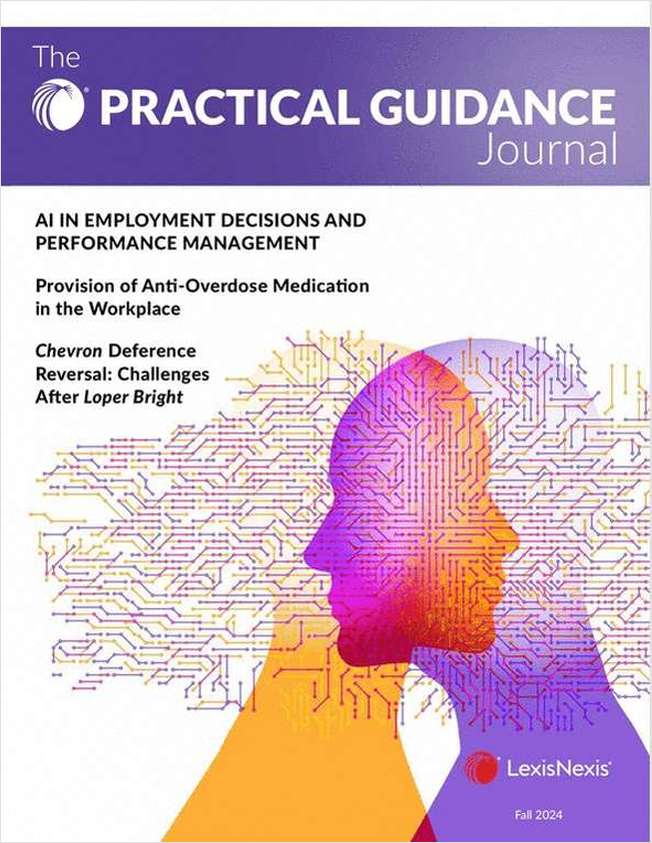Copyright Claims Stick Against D.C. Law Firm
A woman who secretly videotaped sexual harassment by her supervisor at work can pursue copyright infringement claims against a Washington law firm that allegedly made the video public—but only if she drops her anonymity.
March 27, 2015 at 07:05 AM
3 minute read
The original version of this story was published on National Law Journal
A woman who secretly videotaped sexual harassment by her supervisor at work can pursue copyright infringement claims against a Washington law firm that allegedly made the video public—but only if she drops her anonymity.
The woman, who filed the lawsuit under the pseudonym Jane Roe, is a journalist who worked at Phoenix Satellite Television. She recorded a supervisor sexually harassing her in 2012 using a cellphone video camera hidden in her purse, according to court documents. She claimed that a co-worker who helped her save the video for preservation purposes used it in pursuing his own lawsuit against Phoenix in violation of her copyright.
Jane Roe sued the co-worker, Meixing Ren, and Ren's lawyers at the Washington employment firm Bernabei & Wachtel for copyright infringement, racketeering and computer fraud. On Thursday, U.S. District Judge Tanya Chutkan said the copyright claims could proceed. She dismissed the rest of the complaint.
Chutkan said that if Jane Roe wanted to move forward with her lawsuit, though, she would have to use her real name. Roe had argued that the case involved sensitive allegations of sexual harassment, but the judge said the lawsuit dealt with copyright issues, and not the underlying sexual harassment.
The judge also noted that Roe's name was included in documents filed in Ren's lawsuit against Phoenix. Roe was identified in that case as Bingru Wang.
“Plaintiff's complaint is not against her assailant and will likely not involve the graphic details of her assault, but is instead at least one step removed from the actual events of September 6, 2012,” Chutkan wrote. “Moreover, plaintiffs' name is already publicly associated with the video and the underlying incident, through pleadings and motion practice in the Ren suit.”
Chutkan gave Jane Roe until April 2 to notify the court whether she planned to pursue the case using her real name.
Jane Roe's lawyer, Eric Menhart of Lexero Law Firm, said on Friday that he and his client were pleased that at least some of the case survived. “We're evaluating what we might do as far as providing the true name of the plaintiff,” he said.
Lynne Bernabei, a name partner at Bernabei & Wachtel who is also named as a defendant in the lawsuit, declined to comment. Laura Steel of Wilson Elser Moskowitz Edelman & Dicker, who is representing Bernabei and her firm, could not immediately be reached.
Jane Roe previously sued Bernabei, Bernabei & Wachtel and Ren in D.C. Superior Court over the video issue. Roe is appealing the dismissal of that case in the D.C. Court of Appeals.
In the federal court case, Jane Roe argued that the video was “creative” enough to qualify for copyright protection, citing “judgments as to the sight and sounds” that she made in recording the incident on her phone. She applied for and received copyright registration for the video in October 2013, according to court papers. Bernabei and Ren argued there was no such creativity involved.
Chutkan said she had to accept Jane Roe's allegations as true at this stage of the case. However, she hinted that the “creativity” argument was shaky.
“To the extent these allegations suffice to nudge the video across the (low) threshold of creativity, they do so just barely,” the judge wrote.
This content has been archived. It is available through our partners, LexisNexis® and Bloomberg Law.
To view this content, please continue to their sites.
Not a Lexis Subscriber?
Subscribe Now
Not a Bloomberg Law Subscriber?
Subscribe Now
NOT FOR REPRINT
© 2024 ALM Global, LLC, All Rights Reserved. Request academic re-use from www.copyright.com. All other uses, submit a request to [email protected]. For more information visit Asset & Logo Licensing.
You Might Like
View All
Big Law Making Top IP Partner Hires as 'Demand Far Outweighs Supply' of First-Chair Patent Litigators

Clients 'No Longer Need to Be Referred Out': Womble and Lewis Roca Eye Merger Benefits

'Stereophonic' Accused of Copyright Infringement From Fleetwood Mac 'Rumours' Producer
4 minute read
Meta Hit With Class Action for Allegedly Using Pirated Books to Train AI Models
Trending Stories
- 1The Law Firm Disrupted: Playing the Talent Game to Win
- 2GlaxoSmithKline Settles Most Zantac Lawsuits for $2.2B
- 3BD Settles Thousands of Bard Hernia Mesh Lawsuits
- 4Preparing Your Law Firm for 2025: Smart Ways to Embrace AI & Other Technologies
- 5Inside Track: Late-Career In-House Leaders Offer Words to Live by
Who Got The Work
Nicholas M. DePalma and Christian R. Schreiber of Venable have stepped in to represent CP Management Services, CRS RB4 Holdings and other defendants in a pending breach-of-contract lawsuit. The suit was filed Aug. 30 in Virginia Eastern District Court by Greenberg Traurig on behalf of Daito Kentaku USA. The case, assigned to U.S. District Judge Claude M. Hilton, is 1:24-cv-01538, Daito Kentaku USA, LLC v. Comstock Partners, LC.
Who Got The Work
Wyatt, Tarrant & Combs partner Andrew J. Pulliam has entered an appearance for Steve Jensen in a pending breach-of-contract lawsuit. The action, filed Aug. 30 in Tennessee Middle District Court by the Law Office of Perry A. Craft on behalf of Timothy Robins, accuses the defendant of writing a worthless check for over $94,000 for the sale of auctioned goods. The case, assigned to U.S. District Judge Eli J. Richardson, is 3:24-cv-01064, Robins v. Jensen et al.
Who Got The Work
Lane Powell shareholder Pilar C. French has entered an appearance for Penney OpCo LLC in a pending consumer class action. The complaint, filed Aug. 26 in Oregon District Court by Hattis & Lukacs, alleges that the company markets fictional discounts for certain products. The case, assigned to U.S. Magistrate Judge Mustafa T. Kasubhai, is 6:24-cv-01414, Gamble v. Penney OpCo LLC.
Who Got The Work
Donald L. Carmelite and Coryn D. Hubbert of Marshall Dennehey have stepped in to defend the City of York, Detective Roland Comacho and Detective Lisa Daniels in a pending civil rights lawsuit. The complaint, filed Aug. 27 in Pennsylvania Middle District Court by Levin & Zeiger on behalf of Noel Matos Montalvo, seeks damages for the amount of time that Montalvo was incarcerated over five years for the exonerated killing of his common law wife. The case, assigned to U.S. District Judge Jennifer P. Wilson, is 1:24-cv-01459, Montalvo v. City of York, et al.
Who Got The Work
Joseph M. Englert, Brian E. Pumphrey and M. Laughlin Allen of McGuireWoods have entered appearances for Bank of America NA in a pending class action. The action was filed Aug. 26 in Georgia Northern District Court by Podhurst Orseck; Webb, Klase & Lemond; Crabtree & Auslander; and Morrison + Associates on behalf of the representative of the beneficiaries of the Arthur N. Weinraub Trust, a trust which contains residential real property. The suit accuses the defendant of overcharging the trust by selecting unnecessary and/or excessively priced insurance for the property. The case, assigned to U.S. District Judge Thomas W. Thrash Jr., is 1:24-cv-03780, Weinraub v. Bank of America, N.A.
Featured Firms
Law Offices of Gary Martin Hays & Associates, P.C.
(470) 294-1674
Law Offices of Mark E. Salomone
(857) 444-6468
Smith & Hassler
(713) 739-1250








